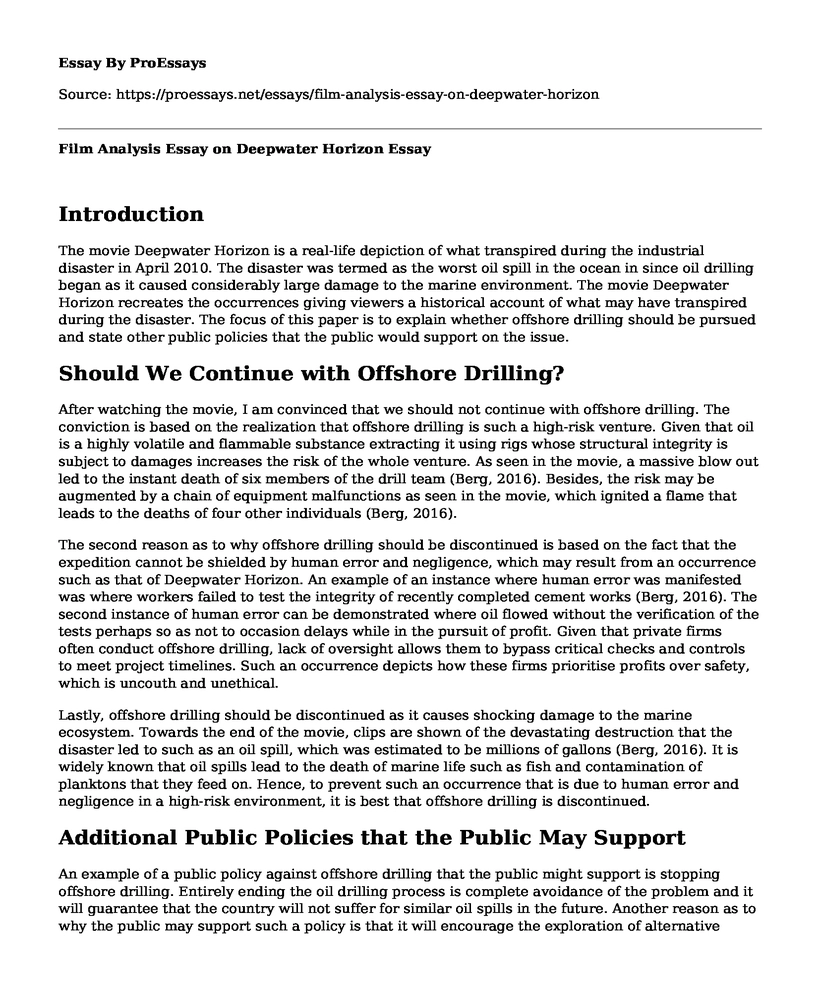Introduction
The movie Deepwater Horizon is a real-life depiction of what transpired during the industrial disaster in April 2010. The disaster was termed as the worst oil spill in the ocean in since oil drilling began as it caused considerably large damage to the marine environment. The movie Deepwater Horizon recreates the occurrences giving viewers a historical account of what may have transpired during the disaster. The focus of this paper is to explain whether offshore drilling should be pursued and state other public policies that the public would support on the issue.
Should We Continue with Offshore Drilling?
After watching the movie, I am convinced that we should not continue with offshore drilling. The conviction is based on the realization that offshore drilling is such a high-risk venture. Given that oil is a highly volatile and flammable substance extracting it using rigs whose structural integrity is subject to damages increases the risk of the whole venture. As seen in the movie, a massive blow out led to the instant death of six members of the drill team (Berg, 2016). Besides, the risk may be augmented by a chain of equipment malfunctions as seen in the movie, which ignited a flame that leads to the deaths of four other individuals (Berg, 2016).
The second reason as to why offshore drilling should be discontinued is based on the fact that the expedition cannot be shielded by human error and negligence, which may result from an occurrence such as that of Deepwater Horizon. An example of an instance where human error was manifested was where workers failed to test the integrity of recently completed cement works (Berg, 2016). The second instance of human error can be demonstrated where oil flowed without the verification of the tests perhaps so as not to occasion delays while in the pursuit of profit. Given that private firms often conduct offshore drilling, lack of oversight allows them to bypass critical checks and controls to meet project timelines. Such an occurrence depicts how these firms prioritise profits over safety, which is uncouth and unethical.
Lastly, offshore drilling should be discontinued as it causes shocking damage to the marine ecosystem. Towards the end of the movie, clips are shown of the devastating destruction that the disaster led to such as an oil spill, which was estimated to be millions of gallons (Berg, 2016). It is widely known that oil spills lead to the death of marine life such as fish and contamination of planktons that they feed on. Hence, to prevent such an occurrence that is due to human error and negligence in a high-risk environment, it is best that offshore drilling is discontinued.
Additional Public Policies that the Public May Support
An example of a public policy against offshore drilling that the public might support is stopping offshore drilling. Entirely ending the oil drilling process is complete avoidance of the problem and it will guarantee that the country will not suffer for similar oil spills in the future. Another reason as to why the public may support such a policy is that it will encourage the exploration of alternative sources of energy, which will not only conserve marine life but also reduce emissions.
Another policy that the public would support is the reconstitution of the U.S Mineral Management Service. Smith (2010) suggests that roles in the institution should be separated by dividing the revenue management service department from environmental protection services. It will be instrumental if the flat organizational structure in the institution is revamped to a hierarchal structure that places ecological protection as a superior department the revenues department. The restructuring will be an indication that safety of the marine ecosystem is prioritized over revenue generation. Furthermore, more resource allocation should be provided to the safety and environmental enforcement department to increase their scope of supervision and inspection. The restructuring can be manifested in the figure below.
Figure 1: Old Structure
Figure 2: Proposed Structure
Lastly, members of the public would support a policy that allows scrutiny over the oil drilling companies. The policy should enable objective scrutiny which is meant to ascertain whether the company is an adherent to safety and risk controls and procedures (Smith, 2010). Such a policy should allow government agencies and investigative reporters to visit and assess the drills operational areas to determine if they are safe.
Conclusion
The movie Deepwater Horizon provided insights on how offshore drilling are susceptible to disaster. Based on what was revealed in the film, it is decided that offshore drilling should be discontinued since it is a high-risk activity, it is susceptible to human error and negligence and can cause devastating damage to human life. It is also suggested that policies that the public can support meant to control such a situation include entirely discontinuing offshore drilling, revamping of the priorities and roles of the U.S Mineral Management Service and allow objective scrutiny of the drilling companies.
References
Smith, E. (2010). Think Again: Offshore Drilling. Retrieved July 11, 2018, from https://foreignpolicy.com/2010/08/30/think-again-offshore-drilling/
Berg, P. (2016). Deepwater Horizon. Retrieved July 11, 2018, from https://www.youtube.com/watch?v=RGSNWMLe13g
Cite this page
Film Analysis Essay on Deepwater Horizon. (2022, Jul 01). Retrieved from https://proessays.net/essays/film-analysis-essay-on-deepwater-horizon
If you are the original author of this essay and no longer wish to have it published on the ProEssays website, please click below to request its removal:
- Documentary Blackfish Review
- Holly Hughes Essay Example
- Essay Sample on The Use of Propaganda in Fascism
- Cultivating a Healthy Relationship With Social Media Essay Example
- Essay Sample on Cultural Significance of Art in Florence
- Essay Example on Witness an Exceptional Art Form: The Art of Change Opera Prelude
- The 'New World' Symphony: Antonin Dvorak's Ninth Masterpiece - Essay Sample







